Last Chance to Catch NYC's Holiday Notalgia Train
We met the voices of the NYC subway on our nostalgia ride this weekend!


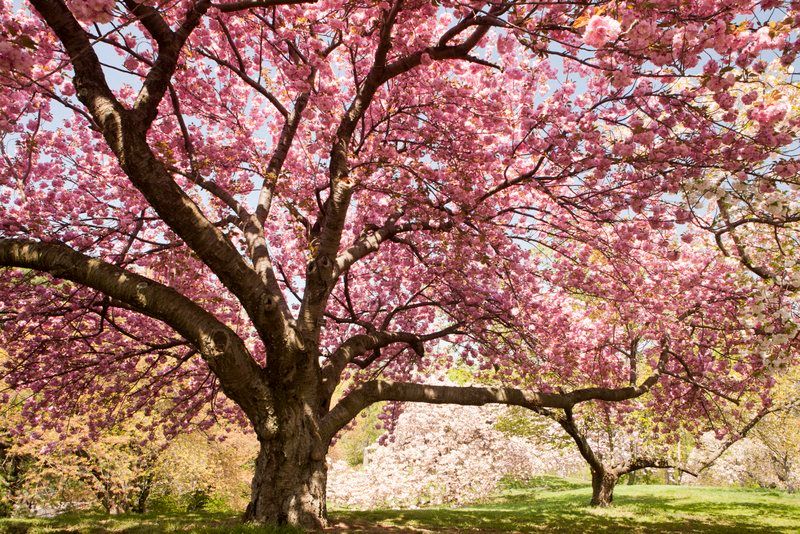
The cherry blossom trees in NYC are beginning to bloom! During this time of year, many will make the annual trek to Washington D.C. to partake in the National Cherry Blossom Festival, but our city is home to its own collection of sakura, the famous Japanese trees — some of which you can find in unlikely locations.
Unknown to many, collections of cherry blossom trees in New York City come from the initial gift from Japan in 1909-1912 to Washington D.C. In fact, the largest collection of cherry blossoms in the United States is in Branch Brook Park, New Jersey with more than 2,700 trees. Though the park is not in New York City proper, we’ve included it at the end of this list. While many locations are forgoing annual cherry blossom festivals this year in favor of virtual alternatives, you are still welcome to visits these beautiful pink-flowered trees on your own to enjoy a safe and socially distanced spring stroll!
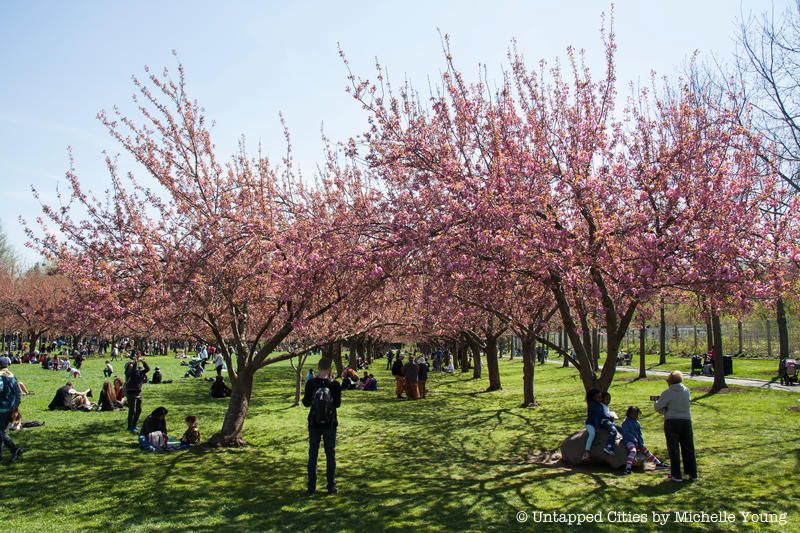
The most famous location for cherry blossom viewing in New York City is the Cherry Esplanade at the Brooklyn Botanic Garden. While there won’t be a 2022 Sakura Matsuri Cherry Blossom festival, guests can still visit the Garden to enjoy the blooms in a safe socially distanced manner. Art in the Garden: Weekends in Bloom will celebrate cherry blossom season with pop-up music and dance performances, guided tours, and special activities for kids on April 23rd, 30th, and May 7th.
Check out our previous photography of the cherry blossoms at the Brooklyn Botanic Garden here. And if you plan on visiting, you’re free to sit on the grassy lawns, but picnic blankets and food are not permitted. You can track the blooms on the Garden’s website to make sure you’ll get a good show when you visit!
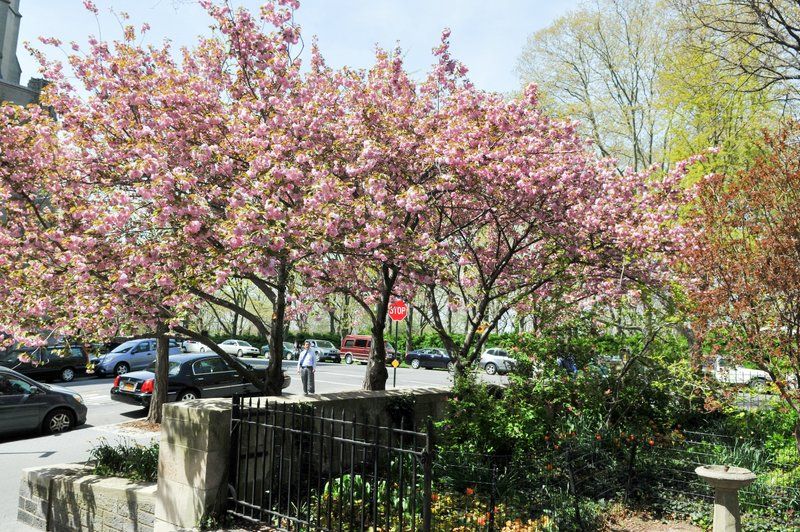
In an extension of Riverside Park, just next to Grant’s Tomb and behind Riverside Church is Sakura Park, which contains trees from the same gift from the Committee of Japanese Residents of New York. The 1909 gift contained 2,000 trees and was sent by boat, but the ship was lost at sea and missed the 18 day festival. The gift was redelivered in 1912.
Sakura Park was built on land donated by John D. Rockefeller. In 1932, Sakura Park was redesigned by the famous Olmstead brothers, using money from a Rockefeller donation. Another update to the park took place in the 1980s. On a visit, don’t miss the stone torii donated by the City of Tokyo to mark the sister city designation between Tokyo and New York City in 1960. The torii was dedicated by the Emperor of Japan (then the Crown Prince Akihito) and his wife, the Princess Michiko.
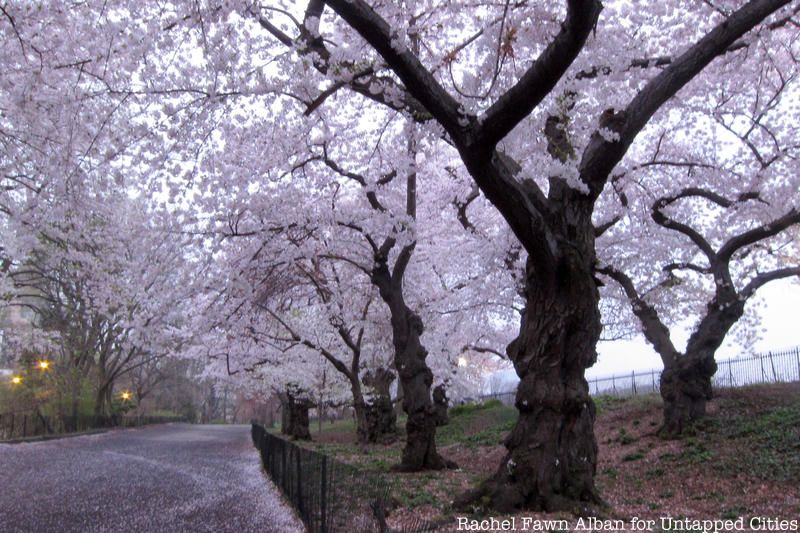
In Central Park, there are two species of cherry blossoms: The Kwanzan Cherry and Yoshino Cherry (the most popular ornamental cherry tree in the park). Like those found along Cherry Walk at Riverside Park, some of the cherry blossom trees at Central Park are part of the original batch from Washington D.C.
The Yoshino Cherry can be spotted on the east side of the Reservoir, Lilac Walk, Conservatory Water, the Ramble, Delacorte Theater, and at the southeast edge of Great Lawn. In addition, the Kwanzan Cherry is planted at the west side of the Reservoir, East Green, West of the Metropolitan Museum (at East 83rd to 84th Streets), East Drive at 744th Street, Bethesda Terrace, across the east Drive from the Loeb Boathouse and at the Southeast corner of the Great Lawn Oval. You can see a map of all the trees in the here!
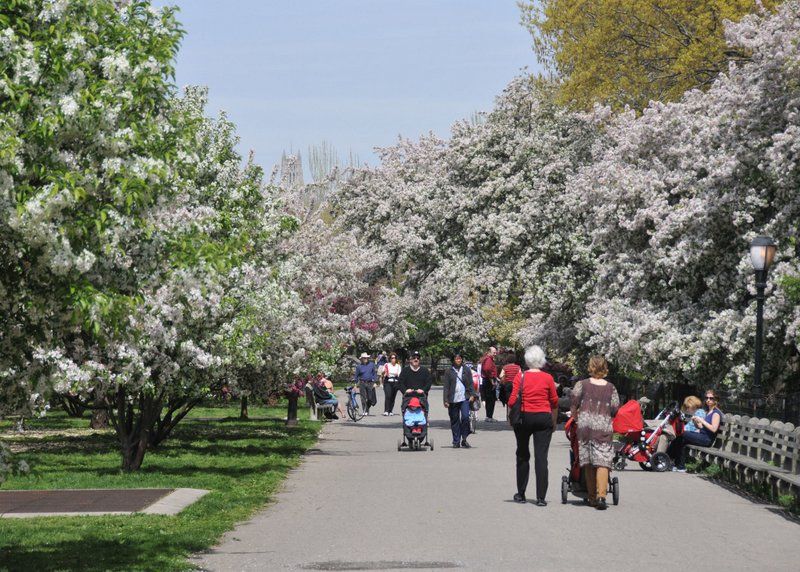
Riverside Park‘s Cherry Walk is a continuous, four-mile-long path along the Hudson River that spans from 72nd street to 158th street. The swath of cherry trees can be found between 100th and 125th Streets. According to NYC Parks and Recreation, this section includes the surviving trees from the original batch that was planted in Washington D.C.’s Tidal Basin as a gift from Japan to the U.S. in 1912.
Another batch comes from a gift from the Committee of Japanese Residents of New York in celebration of the 100th anniversary of Robert Fulton’s steamboat expedition up the Hudson and the 300th anniversary of Henry Hudson’s discovery of the river. Take a walk along the corridor of Cherry Walk for a scenic afternoon or traverse through Riverside Park itself, which is one of only eight officially designated scenic landmarks in New York City.

From April through May and September through November, you can find more than 200 flowering cherry trees dispersed through New York Botanical Garden. Some of the best locations to find both white and pink blossoms include Daffodil Hill, the Arthur and Janet Ross Conifer Arboretum, along the curving path in Cherry Valley and in front of the Enid A. Haupt Conservatory.
The Garden has a wide diversity of cherry trees, including hybrids (such as the Yoshino cherry) or cultivars, such as Prunus ‘Kanzan.’ The New York Botanical Garden also has a cherry blossom tracker so you can figure out the most optimal time to visit.
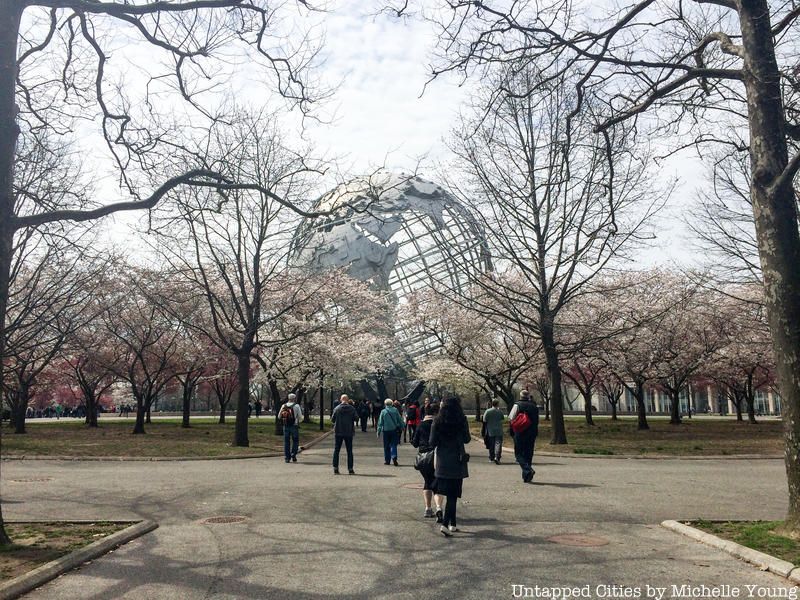
The 168 Yamazakura and Somei-Yoshino cherry trees in Flushing Meadows Corona Park were donated by the Japanese American Association and the Cherry Association of Japan. Before being planted in Queens in April of 2001, the seeds were nursed in the greenhouses of Van Cortlandt Park. NYC Parks recommends that for the prettiest view, visitors should head west on the promenade towards the Unisphere.
You can see the blossoms in bloom on one of our upcoming Remnants of the World’s Fair walking tours!
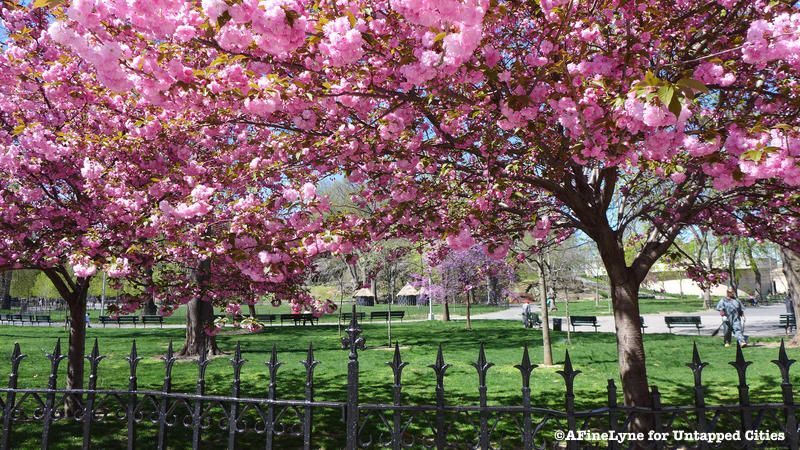
Cherry blossoms can also be found in Marcus Garvey Park in Harlem. The photograph above shows the view at Madison Avenue and 124th Street, near the park’s Drummer’s Circle. Every Saturday the sounds of drums, and sometimes other instruments, fill this corner of the park thanks to a musical tradition which began in 1969. The informal gathering of musicians, which has roots in African and Caribbean traditions, draws a vibrant mix of participants.
Every week there is a different ensemble of people and instruments like trumpets, cowbells, tambourines, and flutes. The drum circle has a designated spot in the park at the base of the Acropolis between 123rd and 124th Streets on the Madison Avenue side of the park.
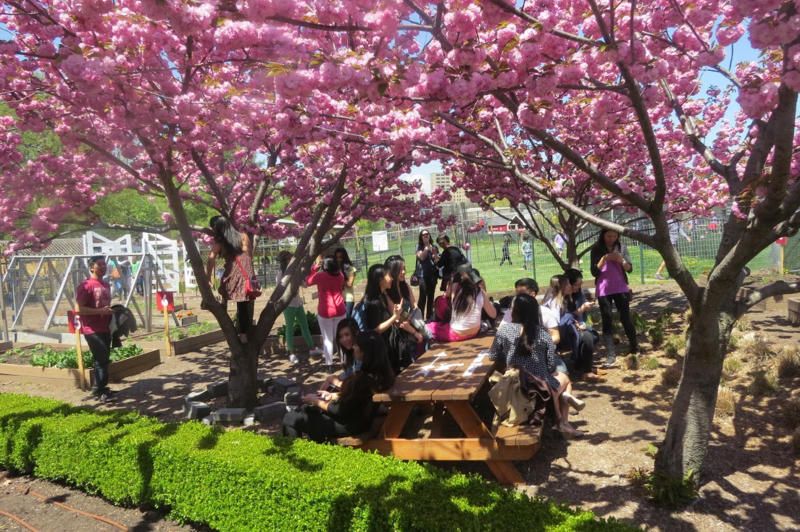
Randall’s Island, located on the East River between East Harlem, the South Bronx, and Queens, has a lot to offer. Along with waterfront views, pedestrian trails, and a 40,000 square foot, environmentally sustainable urban farm, there are lovely cherry trees to view along the western shoreline.
The park has created a variety of activities you can take part in virtually. On the Randall’s Island Park website, you will find a virtual tour of the cherry blossoms, a print-out brochure with a blossom map and activities, coloring pages for kids and more!
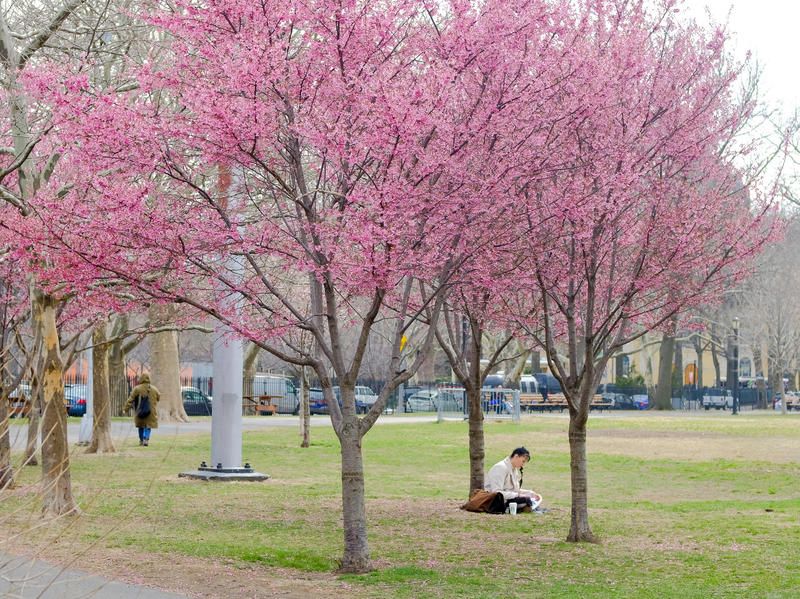
McCarren Park in Brooklyn, located between Greenpoint and Williamsburg, is home to flowering Eastern Redbud trees. These trees grow to about 30 feet tall. Eastern Redbuds have heart-shaped leaves and their clusters of tiny flowers display an intensely bright lavender-pink color.
According to a member of our Untapped Team, the cherry blossom trees look especially nice when lit up at night. Before you visit, learn about the history of the park and it’s most fascinating hidden secrets!
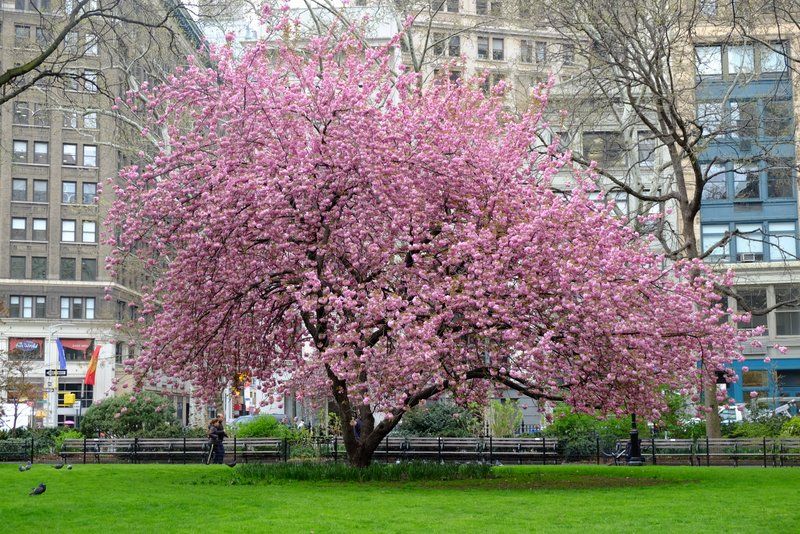
The Flatiron Building, one of New York City’s most iconic triangle-shaped buildings, is a sight to look at all year round, but it’s even more eye-catching come spring. When the weather gets warmer, the iconic, wedge-shaped landmark is framed by cherry blossoms that will be flourishing in nearby Madison Square Park.
Most of the cherry trees at Madison Square Park are Kwanzan Cherry trees. The Kwanzan Cherries usually bloom in early May. The small trees with pink, double flowers are very sensitive to pollution. Due to this sensitivity, they only tend to live for 15 to 20 years in the city, as opposed to the average 60-year lifespan elsewhere. Among the Kwanzan cherries there is one Yoshino Cherry along 5th Avenue, which is interesting to note because Yoshino Cherries are the most popular flowering cherry tree in the world.
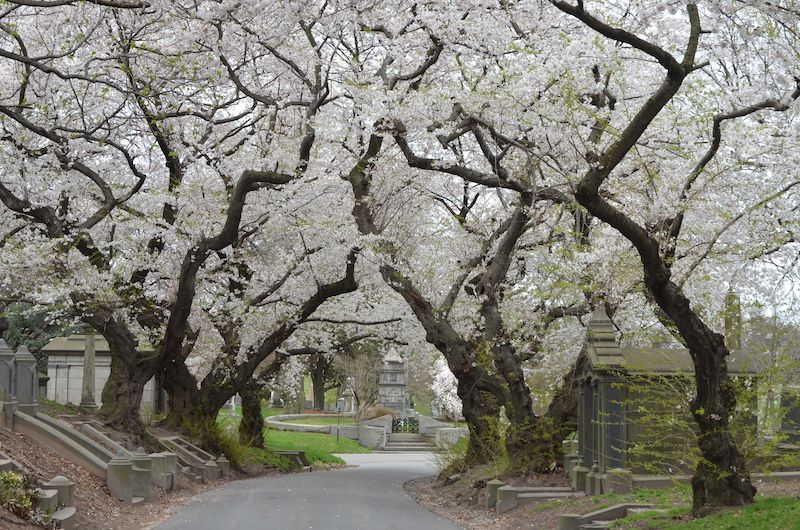
Green-Wood Cemetery is home to both pink and white cherry blossom trees, which you can spot along Battle Avenue and Crescent Water, among other places. Green-Wood Cemetery reports that at this time, some blossoms are already out, more to come mid-April, with the late bloomers to come in mid-May.
There are 172 cherry blossom trees interspersed among the graves and mausoleums of the cemetery, which counts many famous New Yorkers as internments.
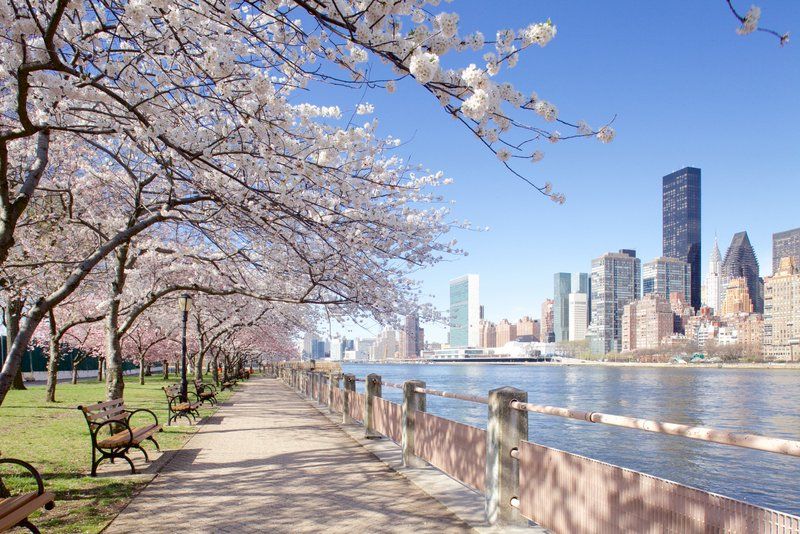
Along the shore of Roosevelt Island, visitors can sit under the shade of the cherry blossom trees while enjoying waterfront views of Manhattan. You’ll find the cherry blossom trees along the East River walkway, a lovely place for a stroll on a warm spring day.
To get to Roosevelt Island from Manhattan, you can take the famous Roosevelt Island Tram, one of the most unique ways to get around New York City. The tram leaves from 59th Street and Second Avenue in Manhattan every 7-15 minutes.
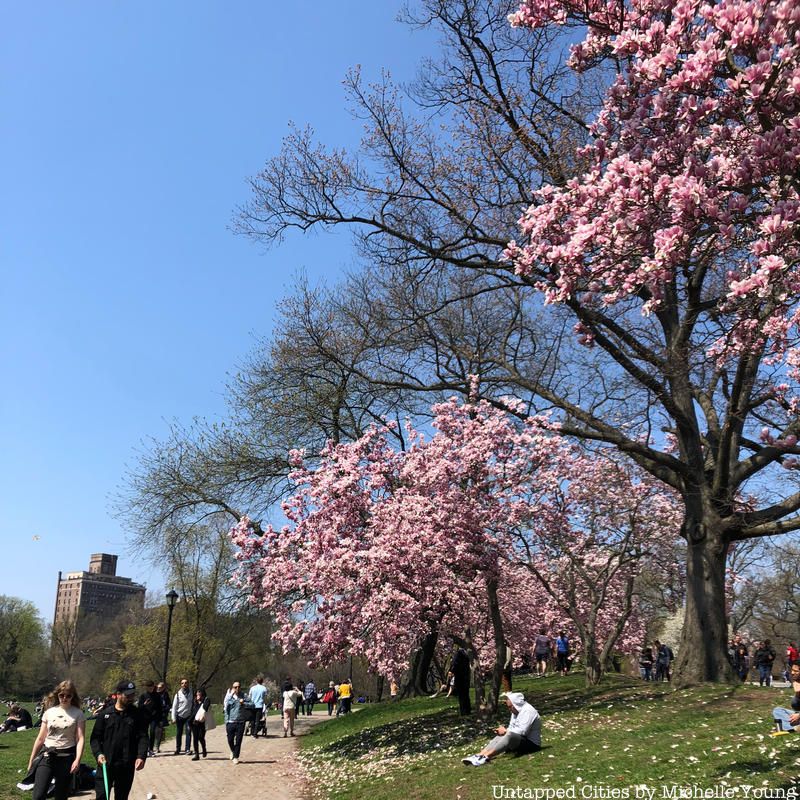
Along the stone path in the Long Meadow at Prospect Park, accessible through the Grand Army Plaza entrance, you will find cherry blossoms. If you aren’t ready to battle the crowds at the Brooklyn Botanic Garden, the park offers a much more low-key way to appreciate cherry blossoms in NYC.
There are also cherry trees at the park’s entrance at Grand Army Plaza. You can find out where all the different types of trees and flowers will blossom throughout the park with the Prospect Park Alliance’s Spring Bloom Guide.
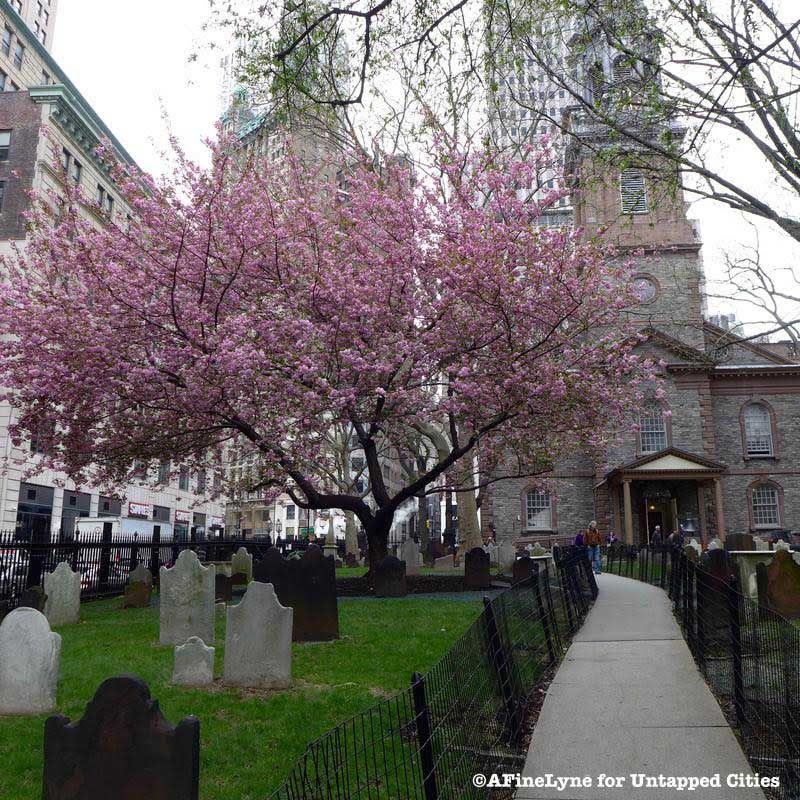
If you find yourself in lower Manhattan, take a moment to stop by St. Paul’s Chapel of Trinity Church, located between Fulton Street and Vesey streets. The church, which is one of the oldest buildings in the city and one of a few physical remnants of New York City’s colonial past, also boasts a large cherry tree on its grounds.
Trees are an important part of St. Paul’s, as some of them acted as natural and necessary support beams for the chapel. Findings from a restoration project which were recounted in a 1962 Parish Newsletter, revealed that tree trunks were actually holding up the roof. The report notes, “When the square casing at the base of the great columns was removed, it was found that the actual tree trunks, which uphold the roof, are of pine, of about 24” in diameter at the base. These bases were worked into octagonal shape up to a height of 44”. The huge tree trunks are each set on a stone base. Thus, each column of the nave is one great tree trunk, faced with fluted wood casing.” See them for yourself on one of our upcoming Hidden Gems of the Financial District walking tours!
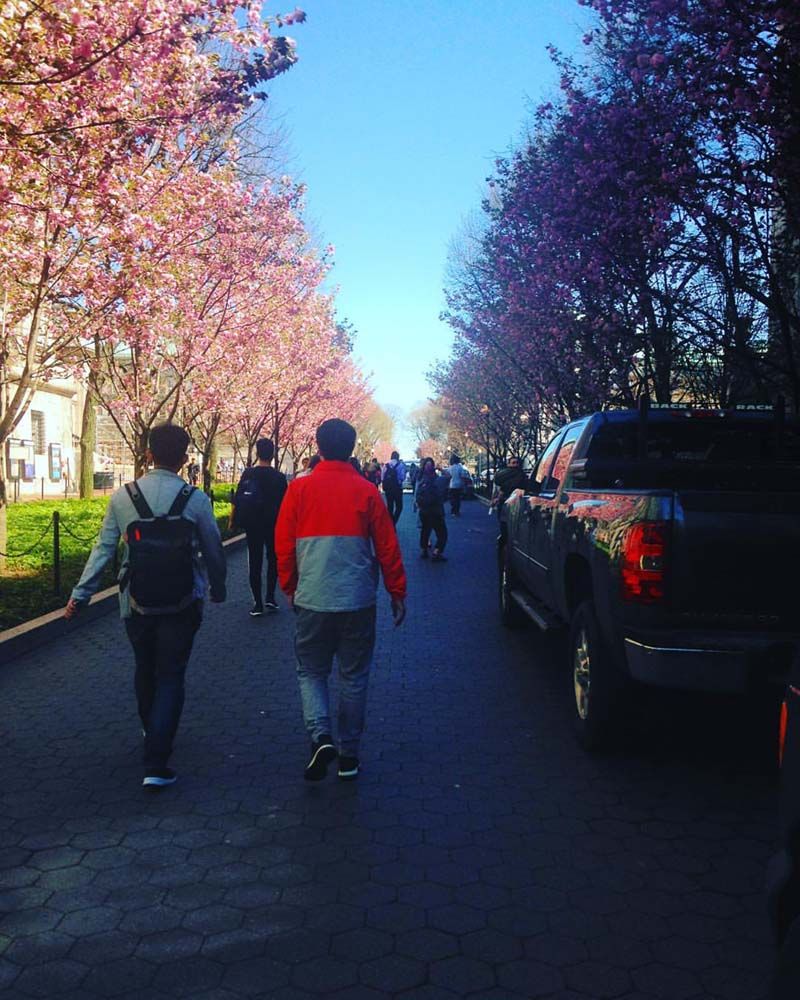
Columbia University is not only home to impressive architecture, but it also harbors its own collection of cherry blossom trees. Spot some along College Walk, a stretch of 116th Street on the Morningside Heights campus, between Broadway and Amsterdam Avenue.
You can also find plenty in front of St. Paul’s-Fayerweather-Schermerhorn-Avery courtyard and Low Memorial Library. While you are visiting the campus of Columbia University, try some of our off-the-beaten path activities, or explore the surrounding area of Harlem.
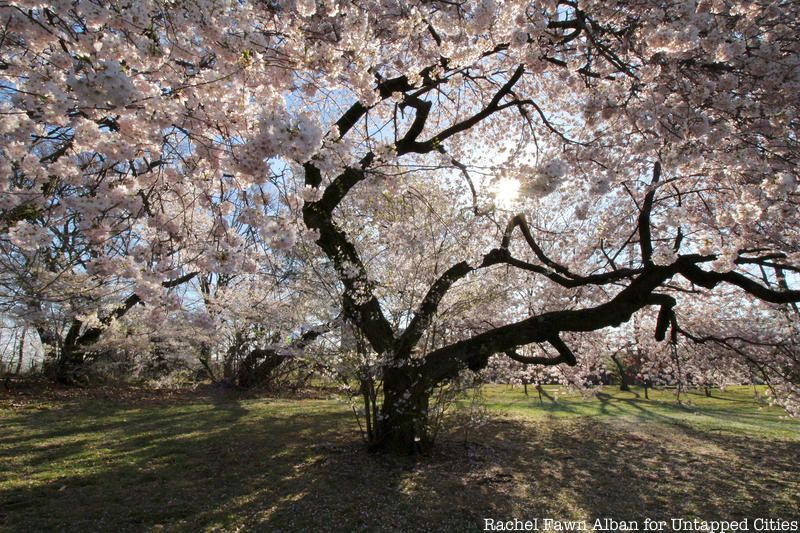
The largest collection of cherry blossoms in the New York City area is actually in Branch Brook Park, New Jersey, with more than 2,700 trees. The park boast even more trees than Washington, D.C.. Branch Brook park was designed by the Olmsted Brothers, successors of the famous landscape architect Frederick Law Olmsted, and you’ll find it similar to, but not as fancy as Central Park.
Next, check out the Cherry Blossoms at Brooklyn Botanic Garden!
Subscribe to our newsletter